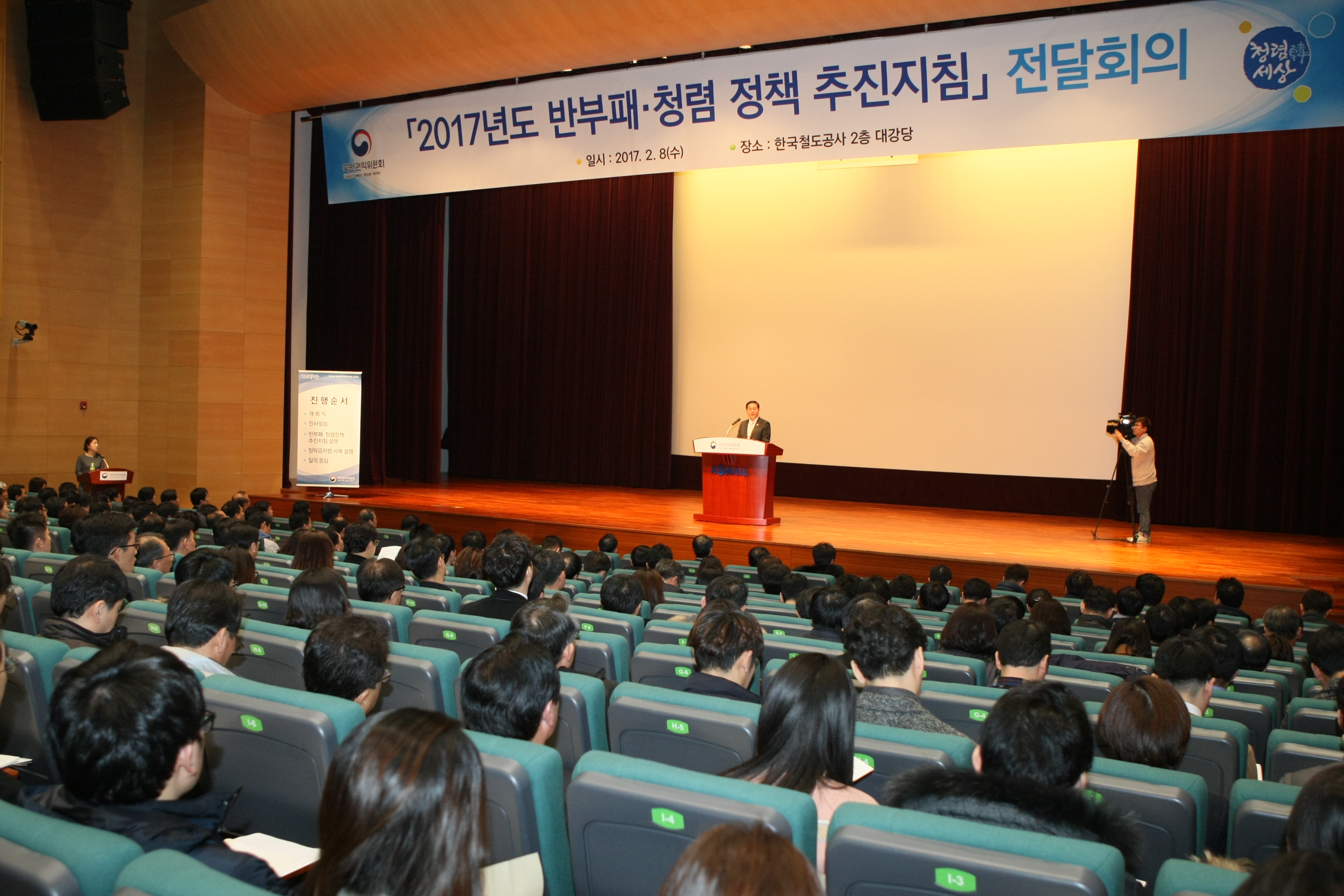ACRC Announces the 2017 Anti-Corruption Policy Guidelines
- Date2017-02-08
- Hit1,288

A meeting was held to discuss uniting the anti-corruption capabilities of government agencies in order to promote anti-corruption policies, including the Improper Solicitation and Graft Act.
On February 8, at the auditorium of the Korea Railroad Corporation, the ACRC convened the 2017 Anti-Corruption and Integrity Policy Guideline Meeting with audit and inspection officials from 1,300 central and local governments in attendance.
Early each year, the ACRC devises its Anti-Corruption and Integrity Policy Guidelines and delivers them to relevant organizations. By doing so, the ACRC aims to share government anti-corruption policy and philosophy, and provide information necessary for public organizations in pursuing integrity initiatives.
This year’s meeting was held at a time when public demand and expectations for the eradication of corruption was particularly high. It thus attracted considerable attention from public organizations.
At the meeting, ACRC representatives explained a number of policies for gathering the government’s anti-corruption capabilities, building a firm anti-corruption infrastructure, internalizing a sense of integrity in public officials, and strengthening public-private anti-corruption cooperation. It also asked public organizations for their more active cooperation and support.
The key points of the guidelines are as follows:
First, anti-corruption infrastructure must be reinforced, and laws and systems must be improved to better prevent corruption. To this end, an institutional foundation must be strengthened so that the Improper Solicitation and Graft Act can stably take root in our society. The code of conduct for public officials must be revised to include rules that prevent conflicts of interest. Institutional improvements must also be made in corruption-prone areas.
Second, public officials must change their mindset to establish a culture of integrity. The revision of the Act on Anti-Corruption and the Establishment and Operation of the Anti-Corruption and Civil Rights Commission last year made integrity education of public officials mandatory. As a result, public organizations and training institutes will organically collaborate to improve a supportive system for integrity education, develop and distribute new educational courses and integrity content, and foster lecturers specialized in integrity for a higher quality of education.
Third, government integrity must be vitalized to spread a culture of integrity throughout society. For this purpose, an integrity citizen auditor system must be reinforced, and the integrity cluster, an ACRC consultative group and other public organizations which have moved to the Innovation City, must be expanded. In addition, the Anti-Corruption Guidelines for Corporations will be distributed to businesses to assist their autonomous integrity related activities.
Fourth, corruption and public interest whistleblowing must be facilitated, and policies for fully protecting reporters must be developed. To guarantee thorough investigations of corruption and violations of the public interest, the management of cases referred to investigative authorities must be strengthened. To facilitate insider whistleblowing, targeted areas will be promoted, and the whistleblower protection system will be further reinforced to prevent the disclosure of reporter identities from the earliest stages of whistleblowing.
Chairperson Sung Yung-hoon highlighted that “As corruption has become a key issue in both public and private sectors this year, it is expected that anti-corruption efforts will be exercised at an accelerated pace across society. The ACRC would like to ask for active participation and keen interest in anti-corruption so that we can pass on a proud, confident Korea to the next generation in which anyone can compete fairly without improper solicitation or entertainment.”









